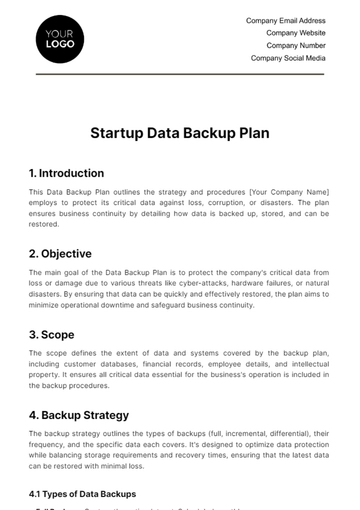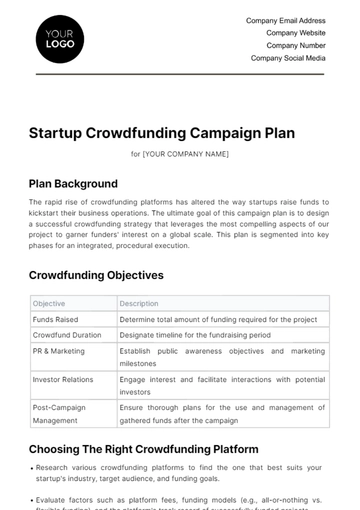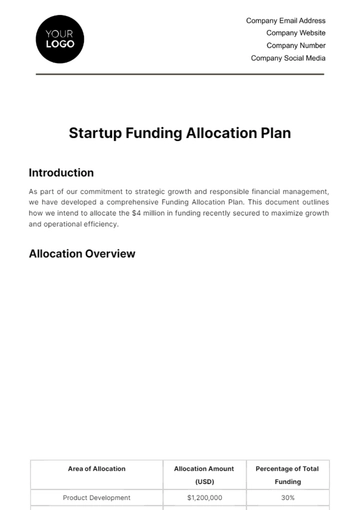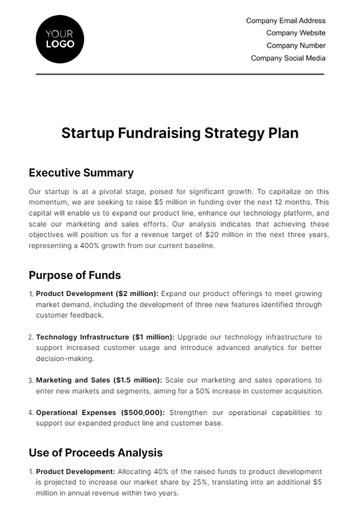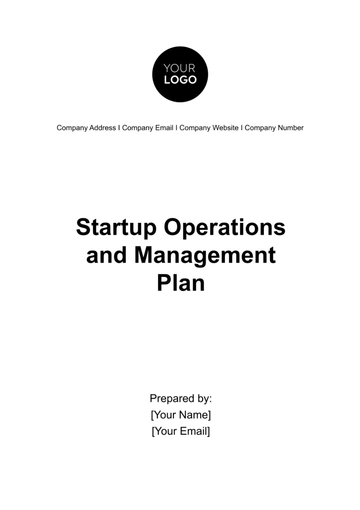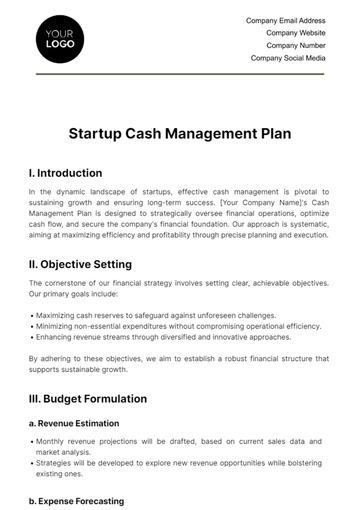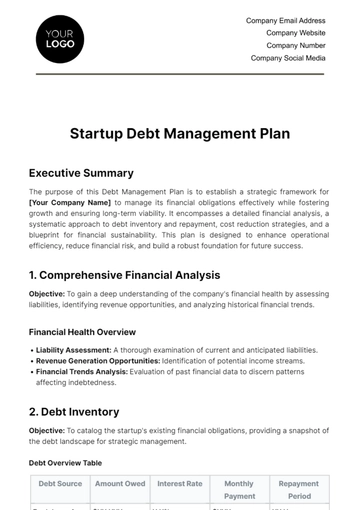Free Startup Cash Management Plan
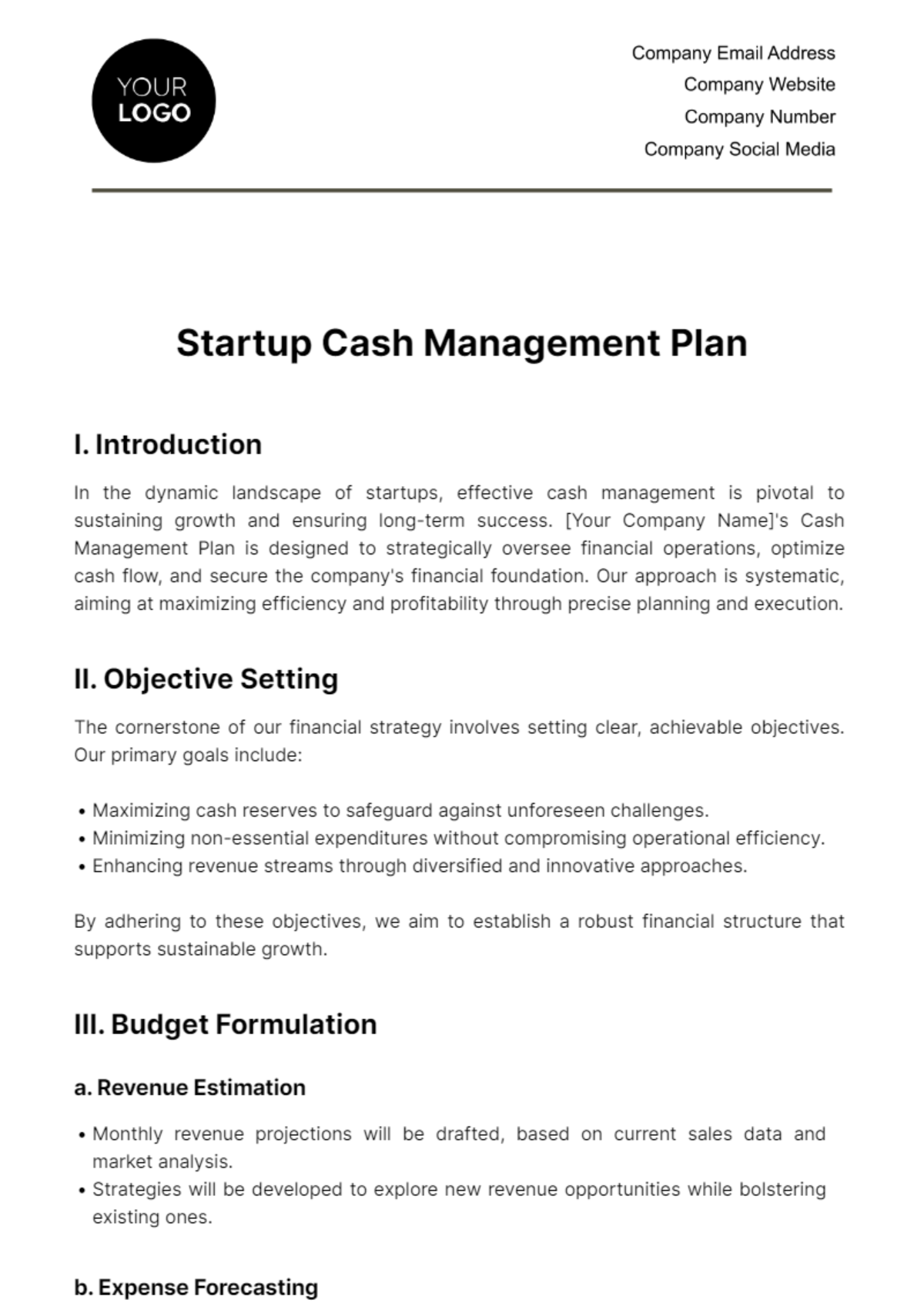
I. Introduction
In the dynamic landscape of startups, effective cash management is pivotal to sustaining growth and ensuring long-term success. [Your Company Name]'s Cash Management Plan is designed to strategically oversee financial operations, optimize cash flow, and secure the company's financial foundation. Our approach is systematic, aiming at maximizing efficiency and profitability through precise planning and execution.
II. Objective Setting
The cornerstone of our financial strategy involves setting clear, achievable objectives. Our primary goals include:
Maximizing cash reserves to safeguard against unforeseen challenges.
Minimizing non-essential expenditures without compromising operational efficiency.
Enhancing revenue streams through diversified and innovative approaches.
By adhering to these objectives, we aim to establish a robust financial structure that supports sustainable growth.
III. Budget Formulation
a. Revenue Estimation
Monthly revenue projections will be drafted, based on current sales data and market analysis.
Strategies will be developed to explore new revenue opportunities while bolstering existing ones.
b. Expense Forecasting
Detailed estimates of material, labor, and overhead costs will be prepared, identifying areas for cost reduction.
A monthly budget will be set, monitoring actual versus projected expenses to ensure financial discipline.
Month | Revenue | Costs | Surplus |
|---|---|---|---|
January | $10000 | $8000 | $2000 |
IV. Cost Analysis
A comprehensive review of fixed and variable costs will be undertaken, with a focus on identifying cost-saving measures.
Future cost projections will account for scalability and market inflation, ensuring preparedness for financial adjustments.
V. Revenue Forecasting
Utilizing industry benchmarks, market trends, and historical sales data, we will forecast revenue growth.
This forecast will help in planning for expansion, investment, and resource allocation.
VI. Cash Flow Management
Continuous monitoring of cash inflow and outflow to identify trends and potential liquidity issues.
Development of strategies to maintain a positive cash flow, ensuring operational costs are covered and surplus cash is effectively utilized.
VII. Emergency Funding
Identification of potential sources for emergency funding, including credit lines, loans, and grants.
Establishment of a contingency fund, allocated from surplus revenues, to provide a financial cushion.
VIII. Investments
Surplus funds will be strategically invested in a diversified portfolio to generate additional income.
Investment decisions will be based on risk assessment, market conditions, and long-term financial goals.
IX. Improving Profits
Regular analysis of product offerings, market positioning, and pricing strategies to enhance profitability.
Exploration of new markets and customer segments to expand revenue sources.
X. Regular Audits
Conducting regular financial audits to ensure compliance with the Cash Management Plan.
Audits help in identifying discrepancies, areas of overspending, and opportunities for further financial optimization.
XI. Plan Review and Modification
The Cash Management Plan will undergo periodic reviews to assess its effectiveness and adaptability to changing market conditions.
Necessary modifications will be implemented to address new challenges and opportunities, ensuring the plan remains aligned with [Your Company Name]'s strategic goals.
This Cash Management Plan is integral to [Your Company Name]'s financial health and growth strategy. It reflects our commitment to fiscal responsibility, operational excellence, and strategic foresight, laying the groundwork for a prosperous future.
- 100% Customizable, free editor
- Access 1 Million+ Templates, photo’s & graphics
- Download or share as a template
- Click and replace photos, graphics, text, backgrounds
- Resize, crop, AI write & more
- Access advanced editor
Explore efficient finance control with Template.net's Startup Cash Management Plan Template. Fully editable and customizable in our Ai Editor Tool, it ensures flawless budgeting for your enterprise's robust growth. Augment your business stability with an innovative, professionally designed cash management template. Elevate your startup's financial planning today – a tool poised to propel your venture towards financial success.
You may also like
- Finance Plan
- Construction Plan
- Sales Plan
- Development Plan
- Career Plan
- Budget Plan
- HR Plan
- Education Plan
- Transition Plan
- Work Plan
- Training Plan
- Communication Plan
- Operation Plan
- Health And Safety Plan
- Strategy Plan
- Professional Development Plan
- Advertising Plan
- Risk Management Plan
- Restaurant Plan
- School Plan
- Nursing Home Patient Care Plan
- Nursing Care Plan
- Plan Event
- Startup Plan
- Social Media Plan
- Staffing Plan
- Annual Plan
- Content Plan
- Payment Plan
- Implementation Plan
- Hotel Plan
- Workout Plan
- Accounting Plan
- Campaign Plan
- Essay Plan
- 30 60 90 Day Plan
- Research Plan
- Recruitment Plan
- 90 Day Plan
- Quarterly Plan
- Emergency Plan
- 5 Year Plan
- Gym Plan
- Personal Plan
- IT and Software Plan
- Treatment Plan
- Real Estate Plan
- Law Firm Plan
- Healthcare Plan
- Improvement Plan
- Media Plan
- 5 Year Business Plan
- Learning Plan
- Marketing Campaign Plan
- Travel Agency Plan
- Cleaning Services Plan
- Interior Design Plan
- Performance Plan
- PR Plan
- Birth Plan
- Life Plan
- SEO Plan
- Disaster Recovery Plan
- Continuity Plan
- Launch Plan
- Legal Plan
- Behavior Plan
- Performance Improvement Plan
- Salon Plan
- Security Plan
- Security Management Plan
- Employee Development Plan
- Quality Plan
- Service Improvement Plan
- Growth Plan
- Incident Response Plan
- Basketball Plan
- Emergency Action Plan
- Product Launch Plan
- Spa Plan
- Employee Training Plan
- Data Analysis Plan
- Employee Action Plan
- Territory Plan
- Audit Plan
- Classroom Plan
- Activity Plan
- Parenting Plan
- Care Plan
- Project Execution Plan
- Exercise Plan
- Internship Plan
- Software Development Plan
- Continuous Improvement Plan
- Leave Plan
- 90 Day Sales Plan
- Advertising Agency Plan
- Employee Transition Plan
- Smart Action Plan
- Workplace Safety Plan
- Behavior Change Plan
- Contingency Plan
- Continuity of Operations Plan
- Health Plan
- Quality Control Plan
- Self Plan
- Sports Development Plan
- Change Management Plan
- Ecommerce Plan
- Personal Financial Plan
- Process Improvement Plan
- 30-60-90 Day Sales Plan
- Crisis Management Plan
- Engagement Plan
- Execution Plan
- Pandemic Plan
- Quality Assurance Plan
- Service Continuity Plan
- Agile Project Plan
- Fundraising Plan
- Job Transition Plan
- Asset Maintenance Plan
- Maintenance Plan
- Software Test Plan
- Staff Training and Development Plan
- 3 Year Plan
- Brand Activation Plan
- Release Plan
- Resource Plan
- Risk Mitigation Plan
- Teacher Plan
- 30 60 90 Day Plan for New Manager
- Food Safety Plan
- Food Truck Plan
- Hiring Plan
- Quality Management Plan
- Wellness Plan
- Behavior Intervention Plan
- Bonus Plan
- Investment Plan
- Maternity Leave Plan
- Pandemic Response Plan
- Succession Planning
- Coaching Plan
- Configuration Management Plan
- Remote Work Plan
- Self Care Plan
- Teaching Plan
- 100-Day Plan
- HACCP Plan
- Student Plan
- Sustainability Plan
- 30 60 90 Day Plan for Interview
- Access Plan
- Site Specific Safety Plan












